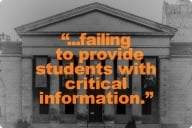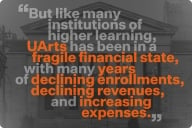You have /5 articles left.
Sign up for a free account or log in.
Some details are emerging on two bids for new accrediting bodies for non-college providers of higher education, such as online course creators or issuers of digital badges.
The Council for Higher Education Accreditation (CHEA) is an association that represents colleges and recognizes accrediting organizations. The nonprofit group is mulling whether it could provide “quality review” for entities that fall outside of those that are currently accredited. One likely example would be StraighterLine, an unaccredited, online education company that offers low-cost courses but not credentials.
“We’re headed in that direction,” said Judith S. Eaton, the council’s president. “We think there’s something there.”
Eaton said the idea is still in its exploratory phase. A key question the council is considering is whether the market for non-college providers will expand enough to warrant an accreditor. However, if the sector does take off, she said, CHEA has a “responsibility” to consider a quality review process.
If the review platform becomes a viable idea, Eaton said the council eventually would look to spin off that work to either an existing accreditor or another group. She said the council's role would be to develop the new form of quality review, not to become an accrediting body. (Note: This paragraph has been added to an earlier version of this article to clarify CHEA's intentions, based in part on new information the group provided.)
The council’s approach differs from another upstart that is taking a look at creating a new accreditor. That concept, which is dubbed Modern States, a play on the name of a regional accreditor, would do reviews for individual online courses, rather than institutions.
David Bergeron, a former official at the U.S. Department of Education who is vice president of postsecondary education policy at the Center for American Progress, is playing a leadership role in the Modern States concept, He has teamed up on the project with Steven Klinsky, a financier and philanthropist who heads New Mountain Capital, an investment fund that is worth more than $12 billion. (The two previewed the idea in an opinion piece on Inside Higher Ed.)
Bergeron and Klinsky said their goal is to increase students’ access to low- or zero-cost online courses. While there has been a rapid expansion of these offerings, such as courses from Coursera or edX, the pathway to credit has not kept pace with the technology.
“There are a lot of people taking MOOCs,” said Bergeron. “It doesn’t lend itself to a niche solution.”
Modern States will be a nonprofit, Klinsky said. The hope is that it will be a “catalyst” to move traditional colleges to recognize more credits for courses from high-quality providers like Coursera. He wants Modern States to prevent the growth of low-cost online learning from being squashed by entrenched interests in the academy – or by a flood of weak, low-quality alternatives.
Klinsky also said Modern States is agnostic about which upstart gets the job done.
“If there is some other organization that achieves the goal first, that’s fine,” he said.
The concept for a new course-based accreditor would be an addition to the existing accreditation system, said Klinsky, not a replacement for it.
“I’m not trying to be critical of the regional accreditors,” he said. “This is not an attack on anybody.”
Path to Financial Aid?
Accreditors have taken plenty of lumps lately, even if Modern States’ creators aren’t looking to add to the criticism.
Politicians on both sides of the aisle have pushed hard for accreditors to do more to encourage innovation. Most notably, President Obama and Sen. Marco Rubio, a Florida Republican, have floated the idea of a national accreditor for emerging models of higher education.
Presumably this new accrediting body could gain federal recognition under Title IV of the Higher Education Act, although a change in law might be required. That scenario would mean students could use federal financial aid to enroll in courses or institutions that received its stamp of approval. To get there, the National Advisory Committee on Institutional Quality and Integrity (NACIQI), a federal panel, and the U.S. secretary of education would have to sign off on the accreditor’s authority.
That won’t be easy. One reason, observers said, is that higher education has a vested interest in tamping down new competition from “unbundled” course providers.
Andrew Kelly, director of the Center on Higher Education Reform at the American Enterprise Institute, said it’s hard to tell where, exactly, resistance to new approaches to higher education comes from. But relying on the academy and regional accreditors to break the logjam probably won’t work, he said.
If the status quo is “baked into the way the department approves” a new accreditor, Kelly said, “then that maybe needs to change.”
Title IV status for a new accreditor aimed at non-institutional providers would probably have to happen as part of the reauthorization of the Higher Education Act, experts predicted. And that won’t happen any time soon.
Modern States is open to the idea of pursuing federal recognition at some point, assuming their concept becomes a reality. (CHEA said the issue of Title IV has come up as they consider a new form of quality review.) But for now both groups are focusing on quality assurance in the Wild West of online learning, with the prospect of access to federal financial aid staying on the back burner.
The council is talking through a review process -- and possibly standards -- for measuring “evidence of student achievement” at the institutional level, Eaton said.
One possible scenario would be for a team of experts to review a provider’s approach and offerings to see if they meet the standards. Reviewers might look at how learning was required and demonstrated, whether it is college-level, how it was measured and, perhaps, whether the curriculum lends itself to the transfer of credit to other institutions.
Eaton said possible candidates for these reviews might include the Mozilla Foundation’s badging platform, or even short-term academies like Koru or General Assembly, which provide work-place training in areas like computer programming.
“We want to be focused on the provider,” she said, by requiring that they show "evidence that students are learning.”
In contrast, Modern States would review individual courses from online providers to ensure that they are rigorous and academically sound. Students who took those courses would then need to successfully complete an assessment that would seek to measure what they had learned.
Klinsky said the proposed accreditor would work with an assessment firm, perhaps a company like Pearson, to develop the tests. Students would probably have to pay a fee to take the assessments, but Modern States would require that the fees be negligible.
A first step for the accreditor would be to create a “freshman year” catalog of free- or low-cost online courses from non-accredited providers, Klinsky said.
Lessons Learned
Some players already offer services that are similar to what the two groups are proposing. For example, the American Council on Education (ACE), which is higher education’s umbrella group, does institutional reviews for credit recommendations, which colleges can choose to accept or reject for transfer credit. The bulk of those reviews are focused on training by large corporations, such as McDonald’s. But ACE has also approved a handful of MOOCs for credit recommendations. (The National College Credit Recommendation Service plays a similar role.)
However, Bergeron said ACE’s move into the online course space has been fairly limited. Modern States would aim to review a relatively large number of courses.
A course-based accreditor could get a boost from the U.S. Senate. Mike Lee, a Republican from Utah, earlier this year proposed legislation that would allow states to create their own, alternative forms of accreditation.
“The state-based alternatives would not be limited to accrediting formal, degree-issuing ‘colleges,’” Lee wrote in an opinion piece The Federalist published. “They could additionally accredit specialized programs, apprenticeships, professional certification classes, competency tests and even individual courses.”
The excitement about course-based academic reviews is interesting to Deb Adair, managing director and chief planning officer for Quality Matters, a Maryland-based nonprofit group. Quality Matters has conducted certification reviews for almost 5,000 online courses during the last decade.
Adair said she has not heard from the other groups that are looking at online course accreditation.
“There are some lessons that we’ve learned that we could share,” she said.
One of those lessons is that course reviews are laborious and fairly expensive. Adair said an ambitious accrediting body that reviewed a large number of courses would keep plenty busy.
“The scope and scale of it boggles the mind,” she said. “There’s a real cost to doing these.”








